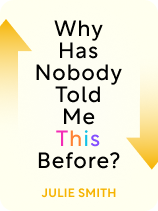

This article is an excerpt from the Shortform book guide to "Why Has Nobody Told Me This Before?" by Julie Smith. Shortform has the world's best summaries and analyses of books you should be reading.
Like this article? Sign up for a free trial here.
What are emotions? What’s the difference between “confident” and “comfortable”? How are low moods part of a vicious cycle?
In Why Has Nobody Told Me This Before?, Dr. Julie Smith shares skills you need to navigate common life challenges and take charge of your emotional and mental well-being. She covers how to identify and challenge negative thoughts, why self-compassion is essential, and how to lessen the power of strong negative emotions.
Keep reading for several Why Has Nobody Told Me This Before? quotes to get a good sense of the book’s ideas.
Why Has Nobody Told Me This Before? Quotes
In Why Has Nobody Told Me This Before?, psychologist Julie Smith writes that people often mistakenly believe that, to improve their mental health, they need to commit to long-term, in-depth therapy—a belief that prevents many from embarking on a wellness journey. However, if people have some basic education about how their minds and bodies work, they’ll be able to take control of their mental health themselves, without intensive help from a professional. She wrote Why Has Nobody Told Me This Before? to supply that education and to provide a practical guide of actionable advice and tools for coping with life’s common challenges.
We collected several Why Has Nobody Told Me This Before? quotes and added some context and explanation to help you understand where Smith is coming from.
“Emotions are your brain’s attempt to explain and attach meaning to what is going on in your world and your body.”
Emotions are your brain’s attempt to make sense of what’s happening, both inside you and in the world around you. When you experience an event, your brain takes all the information it gathers from your senses, your body (your heart rate, blood pressure, breathing rate, hormones, and the like), and your memories of when you felt similarly in the past. It then makes an interpretation of all the data it has, which we often experience as emotions.
“Physically moving your body can help to shift your mind when it is otherwise very difficult.”
Negative thought patterns, particularly self-critical and repetitive ones, can cause low moods. Smith writes that you can cut negative thought patterns off by adjusting your physical state—for example, by changing your environment or body position or even raising your hand and telling yourself, “Stop.”
“But humans are not built to be in a constant happy state. We are built to respond to the challenges of survival.”
The most important thing to know about emotions is that they are a normal part of the human experience, and it’s healthy to have a range of emotions, even if some of them are negative. According to Smith, life isn’t about being happy and content all the time—it’s about meeting challenges, adapting to change, and, ultimately, surviving to see another day. Emotions are a natural response to your physical and psychological states as you navigate these changes and challenges.
“When you are low on energy, the chance of exercising goes down, along with your mood. Low mood gives you the urge to do the things that make mood worse.”
Smith describes how a vicious cycle keeps us stuck in low moods: Our moods impact our thoughts, which impact our actions, which impact our physical health, which further brings down our moods. To stop this cycle, Smith advises paying attention to your physical state, your thought patterns, your actions, and your human connections.
“Just as thoughts are not facts, feelings are not facts either. Emotions are information, but when that information is powerful, intense and loud, as emotions can be, then we are more vulnerable to believing in them as a true reflection of what is going on. I feel it, therefore it must be a fact. Emotional reasoning is a thought bias that leads us to use what we feel as evidence for something to be true, even when there might be plenty of evidence to suggest otherwise.”
Our feelings can provide valuable information, but they don’t necessarily reflect the whole truth of a situation. This means that we shouldn’t rely solely on emotions to dictate how we behave, make decisions, or interact with others, because, if we don’t take a beat to consider other information or perspectives, we can hurt our relationships and get stuck in harmful ruts of behavior.
“Confident is not the same as comfortable.”
Having confidence doesn’t mean feeling completely fearless in new situations—it means trusting yourself and pushing beyond your comfort zone. To do this, you need to be courageous but avoid overwhelming yourself.
“Grief is a normal part of human experience. It is a necessary process to go through when we experience the loss of someone or something that we loved, needed, felt connected to and that held meaning in our life.”
Smith emphasizes that grief is natural, healthy, and essential—it doesn’t signify personal failure or inadequacy. While the intensity of grief can be overwhelming, if we try to numb or escape it, we risk dulling all of our emotions, which could leave us feeling adrift and disconnected from our lives.

———End of Preview———
Like what you just read? Read the rest of the world's best book summary and analysis of Julie Smith's "Why Has Nobody Told Me This Before?" at Shortform.
Here's what you'll find in our full Why Has Nobody Told Me This Before? summary:
- Practical tips for managing difficult emotions and thoughts
- Why self-compassion is key to mental health and how you can cultivate it
- How to change your relationship with failure






